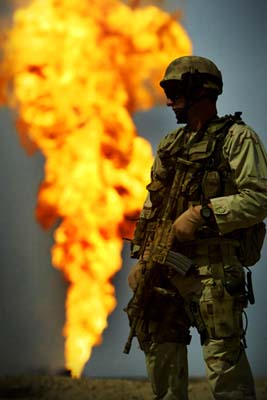The Looting of Iraq
Nearly $9 billion in Iraqi funds disappeared

The corporate media-created popular image of “looting” is one of poor people taking TVs or shoes or other goods from broken-into stores. Many desperate, mostly African American residents of New Orleans abandoned to their fate when Hurricane Katrina flooded that city in 2005 were assailed and arrested as “looters” for appropriating food from shutdown grocery stores.
On July 27, the office of the U.S. Special Investigator for Iraq Reconstruction released a report that states the Pentagon cannot account for an astounding 95 percent of at least $9.1 billion in Iraqi funds that it seized when U.S. forces conquered Iraq and dismantled its government in 2003. A total of $8.7 billion has disappeared from the “Development Fund for Iraq.”
L. Paul Bremer, the head of the Civilian Provisional Authority, who ruled Iraq as a virtual dictator for the 15 months following the April 2003 occupation of the country, set up the DFI. Its funds came from frozen Iraqi assets in the United States and other countries and sales from Iraq’s then-nationalized oil fields.
Did Bremer, the Pentagon and their corporate cronies like Halliburton engage in massive looting? Not according to the corporate media. The Special Inspector General’s report does not even allege any crime has been committed.
“The breakdown in controls left the funds vulnerable to inappropriate uses and undetected loss,” the audit states, describing theft on an unimaginable scale in the blandest possible terms.
Capitalist establishment knows how to protect its own
The report about the DFI is just the tip of a very big iceberg. The primary target of the corporate looters and the government and military that serves them is Iraq’s vast oil fields.
Iraq ranks among the top three countries in the world in petroleum reserves. When it was a British colony from 1920 to 1958, Iraq’s oil was 100 percent foreign-owned—British, Dutch, French and U.S. oil companies each had a 23.75 percent share. While companies today known as BP, Chevron, Total, Shell, and so on profited from the country’s rich resources, the vast majority of Iraqis suffered from extreme poverty and 80 to 90 percent illiteracy, with little chance of ever seeing a doctor.
Following the 1958 revolution, which put an end to British domination, Iraq’s oil was nationalized. Oil revenues served as the basis for the modernization of the country and dramatic improvements in life for a great part of the population.
The 2003 U.S.-British invasion and occupation returned Iraq to the status of a colony. A primary and openly stated objective of the occupation forces has been the de-nationalization of Iraq’s oil and the opening up of the country to unlimited economic exploitation by U.S. and other transnational corporations—regardless of the human cost. And that cost has been very high.
An estimated 1.2 million Iraqis have been killed since 2003 and millions more wounded or made refugees. Living conditions in most of the country are worse now than even during the period of the sanctions and blockade that preceded the occupation. One bitter irony is that in a country with vast energy resources, there are chronic fuel shortages and in many areas constant electricity blackouts.
More than 4,300 U.S. troops have been killed, and hundreds of thousands have suffered severe physical or psychological wounds. The cost of the war has surpassed $700 billion—$700,000,000,000—and will rise into the trillions.
All of this death, destruction and waste of resources is to secure Iraq for the benefit of the same oil, banking and other corporate criminals who are looting the environment and economy here.

